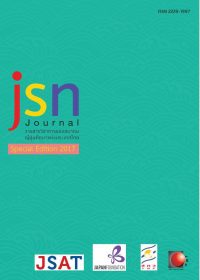Changes in Operating Conditions with the Resignation of Japanese Interpreters in Japanese Companies, Northern Region Industrial Estate, Lamphun Province
Main Article Content
Abstract
In this study it was found that the roles of the Japanese interpreters varied. Initially, they were responsible for translation only. When they had more experience, they would be assigned to do other work related to management and coordination. If they were not flexible enough to handle the new tasks, they would have problems at work. It was related to the main reason for their decision to resign.
In terms of problems and obstacles during work, there was no clear organizational coaching. Since there was only an interpreter for each department, there was no a leader or senior that could coach or train the others. However, the interviewees stated that it was an important process for the supervisor to clearly inform the employees about the job or other information related to work in order to transfer techniques to practical applications and to provide understanding so that they could work with efficiency and accuracy. Moreover, there was also a problem concerning upward mobility in the organization. Each department had only one or two interpreters without a supervisor, so it was not possible to promote the translators to a higher position. In terms of the factors affecting the resignation of the Japanese interpreters, it depended on individual factors. However, there were factors with which everyone agreed that led to the decision to resign. These factors were job description factors and organizational factors.
Article Details
ข้อความและข้อคิดเห็นต่างๆ ในบทความเป็นของผู้เขียนบทความนั้นๆ ไม่ใช่ความเห็นของกองบรรณาธิการหรือของวารสาร jsn Journal
References
ฉัตรวิบูลย์ ฉาวเกียรติ. (2540). ปัจจัยที่มีอิทธิพลต่อการเปลี่ยนงานของผู้บริหารในองค์การเอกชน. วิทยานิพนธ์วิทยาศาสตรมหาบัณฑิต, สาขาวิชาจิตวิทยาอุตสาหกรรมและองค์การ, บัณฑิตวิทยาลัย, มหาวิทยาลัยเชียงใหม่.
เตือนใจ ตันงามตรง. (2537).การสำรวจความต้องการและการใช้ภาษาญี่ปุ่นของภาคธุรกิจ. กรุงเทพฯ: สถาบันบัณฑิตพัฒนบริหารศาสตร์.
ธิติสรณ์ แสงอุไร. (2556). ความพึงพอใจของบัณฑิตต่อการเรียนการสอนภาษาญี่ปุ่นด้านการฟังและการพูดกับความสอดคล้องกับความต้องการของบริษัทญี่ปุ่นในประเทศไทย. วิทยานิพนธ์อักษรศาสตรมหาบัณฑิต, สาขาวิชาภาษาญี่ปุ่นเป็นภาษาต่างประเทศ, คณะอักษรศาสตร์, จุฬาลงกรณ์มหาวิทยาลัย.
นันท์ชญา มหาขันธ์. (2556). การทำงานภายใต้วัฒนธรรมที่แตกต่าง: ปัญหาและความคาดหวังของบริษัทญี่ปุ่น. ใน การประชุมเครือข่ายญี่ปุ่นศึกษาในประเทศไทย ครั้งที่ 6 สังคมศาสตร์และการศึกษา. กรุงเทพฯ: จรัล สนิทวงศ์การพิมพ์.
นุชวรี มาโกมล. (2553). สภาพการณ์และบทบาทของล่ามธุรกิจ. สารนิพนธ์อักษรศาสตรมหาบัณฑิต, สาขาวิชาการแปลและการล่าม, ศูนย์การแปลและการล่ามเฉลิมพระเกียรติ, จุฬาลงกรณ์มหาวิทยาลัย.
นีรนุช ดำรงชัย. (2554). ความคาดหวังและความพึงพอใจต่อคุณสมบัติของผู้จบการศึกษาด้านญี่ปุ่นศึกษาในประเทศไทย. กรุงเทพฯ: สำนักวิจัย สถาบันบัณฑิตพัฒนบริหารศาสตร์.
ศิริวรรณ มุนินทรวงศ์ และทัศนีย์ เมธาพิสิฐ. (2558). ทิศทางการพัฒนาทรัพยากรบุคคลเพื่อผู้ประกอบการญี่ปุ่นในไทยในศตวรรษที่ 21.วารสารเครือข่ายญี่ปุ่นศึกษา, 5(2), 48-69.
สำนักงานนิคมอุตสาหกรรมภาคเหนือ. (2558). สรุปรายงานการดำเนินการของนิคมอุตสาหกรรมภาคเหนือ.
สุชาดา ทองสระ. (2553). ปัจจัยที่มีผลต่อความก้าวหน้าในอาชีพของพนักงานบริษัทญี่ปุ่นในเขตนิคมอุตสาหกรรม จังหวัดพระนครศรีอยุธยา. วารสารวิชาการคณะบริหารธุรกิจ มหาวิทยาลัยเทคโนโลยีราชมงคลธัญบุรี, 5(2), 41-49.
สุทธิณีย์ แก้วเจริญ. (2542). ปัจจัยที่มีอิทธิพลต่อการลาออกจากงานของพนักงานโรงงานในเขตนิคมอุตสาหกรรมภาคเหนือ. วิทยานิพนธ์วิทยาศาสตรมหาบัณฑิต, สาขาวิชาจิตวิทยาอุตสาหกรรมและ องค์การ, บัณฑิตวิทยาลัย, มหาวิทยาลัยเชียงใหม่.
[前野文康、勝田千紙、Larpsriwawad,N. (2013) 「在タイ日系企業が求める人材‐アンケート調査 より‐」『国際交流基バンコク日本文化センター日本語教育紀要』 第10号
タナサーンセーニー美香、當山 純、高坂千夏子、中井雅也、深澤伸子(2005)「 ビジネスで使う日本語を考える-企業と教育現場の視点から-」『国際交流基バンコク日本文化センター日本語教育紀要』 第2
ナッタポーン・ルアンサクンディ (2011) 「在タイ日系企業における日本的なジェンダー規範の研究― 日本語を使って仕事をするタイ女性の役割の事例から」鈴木規之/稲村務編 『越境するタイ・ラオス・カンボジア・琉球』、彩流社、168-204ページ。


